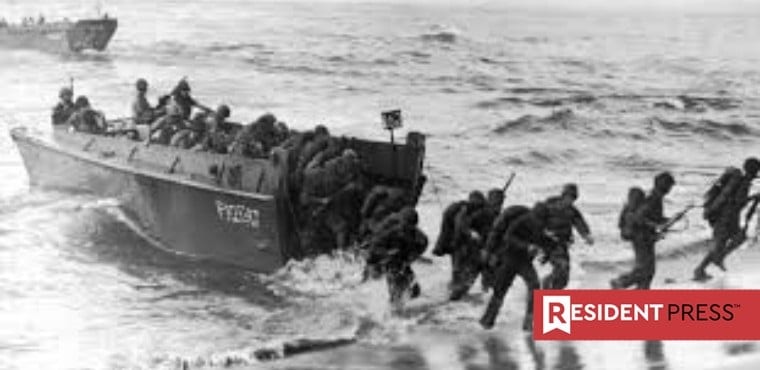My father never really spoke about his service in the Army during World War II. He told small stories but always held back. He had nightmares about the war, even into the end of his life at eighty-one in 1999. I never knew of it but there it was on his army papers I found at his death: Normandy. My father was a hero.
Seventy-five years ago this week, June 6, 1944, a fleet of Allied soldiers, some 150,000 of them, landed on five different beaches in Normandy, France. Their goal was to free Europe from the control of the Nazi regime and Hitler’s grasp. In what has been called the “largest seaborne invasion in history,” the Allies hit those French beaches. The Allied group included Americans, British, Australian, Canadian soldiers as well as men from France, Poland, Norway and Czechoslovakia.
It was called “Operation Overlord” and was planned for over a year. The invasion of Normandy is now referred to as D-Day. Few dates in history are etched in our minds but June 6, 1944 will always be remembered.
One of the reasons it will be remembered is the shear enormity of the campaign itself. Despite the many countries involved in the project, it still came as a complete surprise to Germany. Another reason for its place in our history and memory is the tremendous loss of life but their sacrifice in this one day of the war marked the beginning of the end of Adolf Hitler and the Nazi party.
Launched as the “Operation Overlord” campaign, the battle that initiated the invasion of Normandy is forever etched in history by one word: D-Day. The D simply stands for “day.” The designation was traditionally used for the date of any important military operation or invasion, according to the National World War II Museum. So, the day before June 6, 1944, was known as D-1 and the days after were D+1, D+2, D+ and so on.
Some historians consider it “the single most important day in the 20th century”. Amphibious landings were supported by an airborne drop of 13,000 men later that night. It is stunning to think that more than 11,000 aircraft and 5,000 ships landed across the five Normandy beachheads. They were each given code names: Utah, Gold, Juno, Sword, and Omaha. The day was plagued by bad weather but they had come too far to stop now.
We have all seen film clips of the U.S. troops as they waded ashore during the Allied invasion of Normandy. Even now it is hard to watch as they encountered thousands of German soldiers who were dug deeply into protected keeps high above the beaches. Of the 160,000 Allied troops that stormed those beaches, 9,000 died or were wounded. Hundreds of the men died instantly as the machine guns were ready to rip into them as they dropped the metal doors of the landing crafts. Some drowned due to the weight of the supply packs on their shoulders. Those who survived to the beaches faced a fortified beach of wooden stakes, metal tripods and rolls of barbed wire.
Yet the Allies fought onward. Despite our losses, between 4,000 and 9,000 Nazi troops were killed. By the end of the evening, the Germans were in retreat and the Allies had established control of the area.
I read where thirty-four Virginia National Guard soldiers from the town of Bedford were part of D-Day. Nineteen of them were killed during the first day of the invasion, and four more died during the rest of the Normandy campaign. A D-Day Memorial and Museum has been built in that town, honoring those soldiers and the others who fought, like my father.
The cost of victory was unbelievable. They quickly estimated that there were 10,000 Allied casualties, with 4,414 confirmed dead. Yet, out of this carnage came a new way forward. The western front was finally opened against Hitler, marking the beginning of his downfall.
The invasion of Normandy resulted in a decisive Allied victory over Axis powers in France, and set the stage for an Allied victory over all of Europe one year later.
My father suffered three wounds throughout the war. The last one was on the edge of taking Berlin when a sniper shot him in the chest. The bullet blew his left lung from the exit wound in his left side. I guess my father relived the war in his mind for the rest of his life. In the days before PTSD was a thing and when ‘real’ men dealt with issues, my dad must have suffered horribly. No wonder he had nightmares. This will be a solemn week for me as I respectfully thank my father and the thousands of men who left their blood in the sand on the beaches of France.
Resources: http/www.cbs.news/news http/www.cbs.news/news/Bedford-boys http/www.washingtonpost/news/retropolis (photo) http/www.latimes/nation/nationnow






